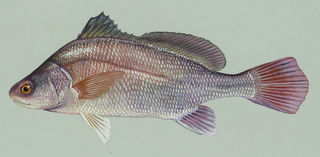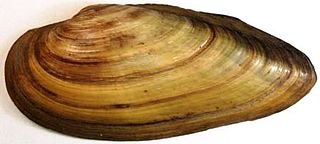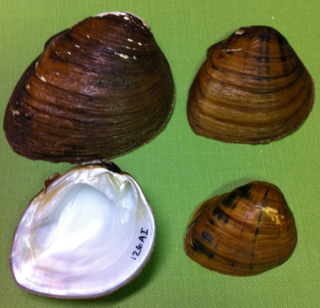
Mussel is the common name used for members of several families of bivalve molluscs, from saltwater and freshwater habitats. These groups have in common a shell whose outline is elongated and asymmetrical compared with other edible clams, which are often more or less rounded or oval.

Pinctada is a genus of saltwater oysters, marine bivalve mollusks in the family Pteriidae. These pearl oysters have a strong inner shell layer composed of nacre, also known as "mother of pearl".
The Dreissenidae are a family of small freshwater mussels, aquatic bivalve molluscs. They attach themselves to stones or to any other hard surface using a byssus. The shells of these bivalves are shaped somewhat like those of true mussels, and they also attach themselves to a hard substrate using a byssus, however this group is not at all closely related to true mussels, being more closely related to the venus clams (Veneridae).

The freshwater drum, Aplodinotus grunniens, is a fish endemic to North and Central America. It is the only species in the genus Aplodinotus, and is a member of the family Sciaenidae. It is the only North American member of the group that inhabits freshwater for its entire life. Its generic name, Aplodinotus, comes from Greek meaning "single back", and the specific epithet, grunniens, comes from a Latin word meaning "grunting". It is given to it because of the grunting noise that mature males make. This noise comes from a special set of muscles within the body cavity that vibrate against the swim bladder. The purpose of the grunting is unknown, but due to it being present in only mature males and during the spawning season, it is assumed to be linked to spawning.

The Unionidae are a family of freshwater mussels, the largest in the order Unionida, the bivalve molluscs sometimes known as river mussels, or simply as unionids.

The freshwater pearl mussel is an endangered species of freshwater mussel, an aquatic bivalve mollusc in the family Margaritiferidae.

Unio is a genus of medium-sized freshwater mussels, aquatic bivalve mollusks in the family Unionidae, the river mussels. They are found throughout Europe, Africa, and the Middle East, with some species introduced to East Asia. Fossil species are also known from the Jurassic of North America.

Unionida is a monophyletic order of freshwater mussels, aquatic bivalve molluscs. The order includes most of the larger freshwater mussels, including the freshwater pearl mussels. The most common families are the Unionidae and the Margaritiferidae. All have in common a larval stage that is temporarily parasitic on fish, nacreous shells, high in organic matter, that may crack upon drying out, and siphons too short to permit the animal to live deeply buried in sediment.

Ellipsaria lineolata is a species of freshwater mussel, an aquatic bivalve mollusk in the family Unionidae, the river mussels. This is the sole species in the monotypic genus Ellipsaria . This species is native to the drainage systems of the Mississippi River, the Mobile River, the Tennessee River, and the Cumberland River in the United States. It exists in the midwestern United States, and has also been observed in the east coast and as far south as the Gulf of Mexico. The common name of Ellipsaria lineolata is the Butterfly Mussel.

Epioblasma is a North American genus of freshwater mussels, aquatic bivalve mollusks in the family Unionidae, the river mussels. Most of the species in this genus have been lost in modern times, and the entire genus is threatened with the possibility of extinction.

Epioblasma flexuosa, the arcuate pearly mussel or leafshell, was a species of freshwater mussel, an aquatic bivalve mollusk in the family Unionidae, the river mussels. This species was endemic to the United States, where it was found in the major drainages of the Ohio River, including the Cumberland, Tennessee, and Wabash Rivers. Its natural habitat was flowing water.

Lampsilis is a genus of freshwater mussels, aquatic bivalve mollusks in the family Unionidae, the river mussels. There are over 100 species in the genus.

Margaritifera auricularia is a species of European freshwater mussel, an aquatic bivalve mollusk in the family Margaritiferidae, the freshwater pearl mussels. Formerly found throughout western and central Europe, the species is now critically endangered and is one of the rarest invertebrates worldwide, being confined to a few rivers in Spain and France. M. auricularia is commonly known as Spengler's freshwater mussel in honour of Lorenz Spengler, who first described this species.
Mutela alata is a species of freshwater mussel in the family Iridinidae. It is endemic to Malawi, where it is known from only five locations in Lake Malawi and the Shire River.

Potamilus is a genus of freshwater mussels, aquatic bivalve mollusks in the family Unionidae, the river mussels.
Pseudospatha tanganyicensis a species of freshwater mussel, an aquatic bivalve mollusk in the family Unionidae, the river mussels. It is the only species in the genus Pseudospatha.
Freshwater bivalves are one kind of freshwater mollusc, along with freshwater snails. They are bivalves that live in fresh water as opposed to salt water, which is the main habitat type for bivalves.

Velesunio ambiguus, the floodplain mussel, or the billabong mussel, is a species of freshwater bivalve in the family Hyriidae.

Pleuronaia dolabelloides, the slab-sided naiad, slab-sided pearly mussel, or slabside pearlymussel, is a species of freshwater mussel, an aquatic bivalve mollusk in the family Unionidae, the river mussels. This species was formerly classified under the genus Lexingtonia.

Ambleminae is a subfamily of freshwater mussel in the family Unionidae. They are found throughout much of eastern North America south to Central America, although fossils are also known from Siberia. Some species have also been introduced to East Asia. They are the most speciose radiation of the Unionidae, with more than 300 species.















